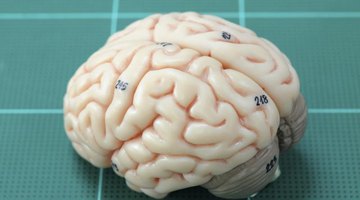Psychology -- as the science of human behavior -- is concerned with biological explanations of behavior as much as it is with higher level cognitive and social factors. Biological psychology studies the relationship between the body and the mind as they are expressed in behavior. Biological psychology is also one of the most developed branches of psychology, and it's closely related to other disciplines -- notably anatomy, physiology, neuroscience, neurology and psychiatry.
Behavior Has Roots in Biology
Psychology is rooted in the evolutionary heritage of humans. This is clearly seen when studying perception. You cannot understand perception and how visual signals are interpreted without knowing how the eyes are constructed, without understanding the neural pathways that lead from the eye to the brain and without understanding the architecture of the visual cortex. It's difficult -- and perhaps impossible -- to show any aspect of behavior that has no biological roots. The development of a human child, including such disparate aspects as attachment and language, have a clear biological basis. Hormones are strongly involved in sexual behavior. The basic principles of learning are the same in animals and humans. Temperament and many aspects of personality are stable throughout life, and they appear to be hard-wired aspects of human neuropsychology.
When the Body Goes Wrong -- the Mind Is Affected
Pathology is another area in which the link between biology and psychology is clear. Genetic abnormalities, such as Down Syndrome, have a profound effect on the intellectual and emotional development of the individual. Damage to the brain, whether at birth or later in life, affects psychological functioning. Psychiatric conditions -- especially the more severe conditions such as psychoses and bipolar spectrum disorders -- have a recognized neurochemical component, and the propensity to develop those is likely to be genetic.
Studying the Body Helps Scientists Understand the Mind
Scientific psychology began with measuring physiological responses to various stimuli. Current techniques of neuroimaging help psychologists and neuroscientists understand and interpret complex, higher level behaviors. Animal studies also help explore such diverse subjects as learning, attachment and group dynamics.
Related Articles
References
Writer Bio
Magdalena Healey has a Master of Science in psychology from the University of Gdansk. She is an English language translator and interpreter, has taught social psychology, information technology and questionnaire design. Healey has also written extensively on travel.









